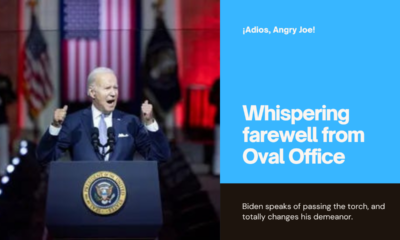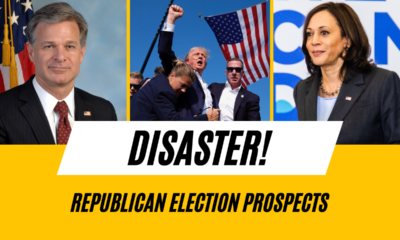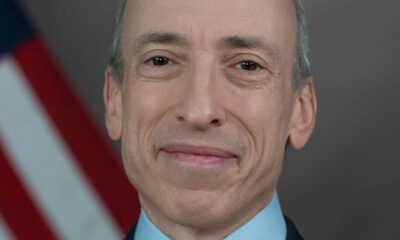Constitution
Prayer wins – but how much?
Prayer by public employees won a partial victory in the Supreme Court today. But Coach Joseph Kennedy conceded too much at the outset.
The Supreme Court seems to be stretching out the high drama of their Big Opinions, however anticlimactic it might seem. Today the Court decided, 6-3, that a football coach, who lost his job for mid-field prayer after games, should get his job back. The school district, in “fear” of breaking the Establishment Clause, broke the Free Exercise and Free Speech Clauses instead. Neil Gorsuch said outright that no government entity has any “duty to suppress religious observances.”
Supreme Court update
The case of Kennedy v. Bremerton School District is one of three opinions the Court released today. The other two cases involved sentencing for distribution of crack cocaine, and the extent of authorization to doctors to prescribe a controlled substance. In addition the Court released a slew of orders containing the usual denials of certiorari. But many of these orders were summary judgments in cases involving attempted interstate robbery, apparently violating the Hobbs Act. The Court had earlier decided another such case (US v. Taylor) in favor of the defendant. Today it remanded a large number of similar cases, saying in effect, “See what we wrote about James Taylor.”
All this leaves four cases remaining to decide. Kennedy was a “Rolling Stone” case, one of several the outlet mentioned as likely to further the “Republican Line.” The other two are:
- Biden v. Texas, concerning whether President Biden had the authority to rescind President Trump’s “Remain in Mexico” policy.
- West Virginia v. Environmental Protection Agency, on whether or not the EPA may regulate carbon dioxide as a pollutant.
How the Court could decide either, is anyone’s guess, especially in light of the other two cases decided today. The Court has designated June 29, the last Wednesday of the month, to issue more opinions.
Is prayer in school ever acceptable?
That was the central issue with Coach Joseph Kennedy. Here is the opinion, which you can read for yourselves.
Coach Kennedy did at first pray alone. He prayed with players only after they asked to join him. These sessions grew to include most of the team. In fact the team, by tradition that began before Coach Kennedy came, had a habit of group prayer in the locker room, before and after games. But never once did Coach Kennedy insist that any player take part in prayer, with or without him.
For more than seven years, no one complained. Then in September of 2015 an employee from a school other than where Kennedy coached, said some good things about these practices to the Superintendent of Schools.
Immediately (on September 17) the District sent Coach Kennedy a letter. The essence of it was:
- Stop all prayer activities,
- Stop your motivational speeches that include prayer or other “religious expression,” and
- Avoid saying anything about prayer to players, for or against.
The District also ordered Coach Kennedy to avoid even the appearance of endorsing prayer or other religious concepts or activities. In fact the District wrote Coach Kennedy of a direct tension between the Establishment Clause and his freedom to speak and exercise his religion.
The prayer showdown
Coach Kennedy at first tried to comply. He stopped all his activities with players, though some of them were traditional even before he started coaching there. But when it came to stopping his own personal mid-field prayers, he balked. Not even to offer his own prayer, he felt, would break his commitment to God. So one fine day he drove back to the school, walked out onto the field, and prayed. Everyone else had already left the field.
Then he “lawyered up.” Through his lawyer, he wrote the District, describing his attempt to comply with everything except refraining from personal prayer. He politely asked the District to let him pray on his own. The District, writing back, said NO. He must never do anything openly that could suggest to anyone that he was endorsing prayer while on duty. Otherwise, the District could have an Establishment Clause lawsuit on its hands. (In point of fact, no record exists of an Establishment Clause complaint against the school or district.)
Coach Kennedy would then take to praying privately, but inevitably adults and/or players would join him. The event got local media attention. This seems to have infuriated the Superintendent even more. Again, absent any complaint from any atheist, secular humanist, or “Freethinker,” the District finally – after three games – put the coach on paid administrative leave. They then closed the field to the public and even had the Bremerton Police guard the field. 2015 would be Coach Kennedy’s last coaching season.
The coach’s next plays
That’s when Coach Kennedy sued the District in the District Court for the Western District of Washington State. He sued on Free Exercise and Free Speech grounds. Then he asked for a temporary restraining order to ge t his old job back. The District Court literally said that a
reasonable observer … would have seen him as … leading an orchestrated session of faith.
So, no TRO. In fact the Court said the District was correct to fear Establishment Clause liability.
The Ninth Circuit agreed with that. Coach Kennedy tried to get certiorari then, but the Supreme Court denied it. But that was not all. Justice Sam Alito said that denying certiorari at that time, didn’t mean the Court agreed with the lower Courts’ actions. Perhaps it meant only that the case was not ripe and wouldn’t be ripe until it had a verdict. Nevertheless Justice Alito expressed concern that the lower courts seemed to be saying a teacher couldn’t say grace before lunch!
So the case went back to the District Court. Both sides did pre-trial discovery and filed cross-motions for summary judgment. The District Court found for the school district. In so finding, the Court held that the “sole reason” for the District firing Coach Kennedy was to avoid Establishment Clause liability. Moreover, the Court held – again – that the District was correct in thinking that.
The Ninth Circus does its legal flying trapeze act
Again the Ninth Circuit affirmed the District Court. So then Coach Kennedy petitioned for an en banc hearing, before all the Justices in the Ninth Circuit. (En banc is French for “on the bench.” Whenever a court with more than one judge or Justice has all its members sitting to hear one case, we say that such a court sits en banc. The Supreme Court always sits en banc.)
The results strike CNAV as very instructive. President Donald J. Trump succeeded in appointing enough of the Court’s present Members that almost half of them are now Republican appointees. This has made the usual three-judge hearings go fifty-fifty conservative or liberal.
The full Court of Appeals denied the petition. But no fewer than eleven judges dissented from that decision. Several dissenters wrote that the majority based its rejection on the Lemon Test. (See Lemon v. Kurtzman, 1971.) That Test requires looking at whether or not a hypothetical observer could conclude that a government agency or employee was endorsing religion on the government’s behalf.
The dissenters must have electrified the judiciary by what they said next. Namely, that the Lemon Test is obsolete! The Supreme Court abandoned the Lemon Test long before this case, and most Courts of Appeals have done the same. But evidently the die-hard bare majority on the Ninth Circuit insists on keeping the Lemon Test alive.
And with that decision, Coach Kennedy again asked for certiorari. This time he got it.
How Coach Kennedy won his prayer case
Justice Neil Gorsuch wrote the Court’s opinion. First, says Gorsuch, Coach Kennedy showed clearly that the school district burdened his own sincere religious observance. The key: the school district never disputed that his prayer custom is a sincere expression of faith. And because the District disciplined him specifically for his religious activity, that in itself made their policy non-neutral. The District also made the mistake of accusing him of failure to supervise his players adequately post-game. But it does not discipline other coaches who leave their players unsupervised to take personal telephone calls and such. Therefore their policy was not generally applicable.
Justice Gorsuch went on to say that
Neither [teachers nor students] shed their constitutional rights to freedom of speech or expression at the schoolhouse gate.
Now obviously this didn’t let Coach Kennedy say anything anytime. But his prayer activities were private matters and never official school or other government policy.
So what other argument did the Ninth Circuit have? That Coach Kennedy, as a role model, couldn’t help but endorse prayer. Justice Gorsuch rejected out-of-hand this “excessively broad job description.” In fact he echoed Alito’s earlier concern about a policy that could forbid a teacher to say grace before lunch.
The burden on the school district
These showings put the burden on the school district to show that firing Coach Kennedy was part of a policy:
- Serving a compelling interest, and
- Narrowly tailored to serve that interest.
And does their policy meet those tests? NO. Again, the school district, and the lower courts, relied on the Lemon Test. So even though the school district never endorsed Coach Kennedy’s prayer activities, they felt even allowing them would fail the Lemon Test. Justice Gorsuch thumped the lower courts for forgetting that the Supreme Court does not regard the Lemon Test as settled law. Then he said this:
This Court has since made plain, too, that the Establishment Clause does not include anything like a “modified heckler’s veto, in which … religious activity can be proscribed” based on “‘perceptions’” or “‘discomfort.’”
Therein lies the problem! The Bremerton School District was applying a modified heckler’s veto. And because no one else had ever complained, that made the Superintendent the heckler interposing a veto.
The backup argument
According to Gorsuch, the school district must have known that its Lemon Test argument would fail. So they introduced another argument in their brief. According to it, to let Coach Kennedy pray would be to coerce players to pray.
Lay aside whether petitioners for certiorari may introduce new arguments they never advanced earlier in the case. In fact the district never adduced one scintilla of evidence that Coach Kennedy was coercing anyone to do anything. (With one possible exception, about which see below.)
To that, Justice Gorsuch offers a smackdown to the entire Woke Crowd.
Learning how to tolerate speech or prayer of all kinds is “part of learning how to live in a pluralistic society,” a trait of character essential to “a tolerant citizenry.”
Shazzam! The Woke Crowd lives by a maxim that one never tolerates prayer or any other speech with which one disagrees. Justice Gorsuch just proved what lay at the heart of the District’s attitude. Namely that the Superintendent is a Woke Crowd denizen applying typical Woke values. This should surprise no one – because Bremerton is a suburb of Seattle, site of the “Capitol Hill Autonomous Zone.”
Gorsuch went on to say that high school students, while not adults, are still “mature enough” to understand that permission does not equate to endorsement.
Did Coach Kennedy coerce prayer by command or implication?
Allegedly some parents said so, after Coach Kennedy lost his job. The school district says some parents told its staff that their sons had
participated in the team prayers only because they did not wish to separate themselves from the team.
Funny, says Gorsuch. Those team prayers were part of the locker-room tradition that Coach Kennedy, at the demand of the Superintendent, ended. No player on his team joined him in the midfield prayers at issue. Tellingly, opposing team players did. What authority did Coach Kennedy have over them? None!
Finally the school district seems to say that any religious activity by a teacher, where students can see it, is ipso facto coercive. Which means that
The only acceptable government role models for students are those who eschew any visible religious expression.
And that in turn means the government must promote atheism.
The dissent
Chief Justice Roberts and Justices Alito, Barrett, and Thomas all joined this opinion. So did Justice Kavanaugh, in all but the free-speech burden part. (Not that it mattered, because the free-exercise burden was enough to shift the burden onto the school district.)
Justice Sotomayor (no surprise) wrote the dissent, in which Justices Breyer and Kagan joined. Justice Sotomayor alleges – incorrectly – that this case is about Coach Kennedy’s activities before the games in question. In other words, Sotomayor is trying to make ex post facto law, which the Constitution forbids.
But she also observes something the majority probably would not dispute. She accuses the Court of overruling Lemon v. Kurtzman. The only dispute here is whether the Court had overruled Lemon long before this. What one cannot dispute is that, if Lemon were not a dead letter before this case, it is now. Sotomayor clearly laments that.
In fact Sotomayor continues her advocacy for strict separation of faith and state (which she mislabels as separation of church and state) that she held forth in her dissent in another case from this term, Carson v. Makin. Indeed every word of her dissent, beyond misrepresenting the case record, reeks of contempt for the Christian faith. Recall how her dissent in that case began:
This Court continues to dismantle the wall of separation between church and state that the Framers fought to build.
That statement, of course, is utterly without foundation, as John Adams could have told her.
Concurrences
Justice Clarence Thomas voted to uphold the judgment of the Court. But in his two-page concurrence, he says the opinion does not go far enough. It does not address fully, in his view, what rights a public employee has under the Free Exercise Clause. Nor does it address exactly what burden the employer has when seeking to justify disciplinary action that touches an employee’s free exercise of religion. The Court addressed Coach Kennedy’s Free Speech rights but not necessarily his Free Exercise rights.
Justice Sam Alito’s concurrence runs to one paragraph of 108 words. He has only one quarrel: this case does not lay out exactly how to evaluate the private acts of an employee during “a brief lull in his duties.”
Analysis: prayer wins, but how much?
At best prayer wins a partial victory in this case – like the Allies taking a “toe hold” on the Normandy beaches after D-Day. This is not the capture of Monte La Difensa (as in Dobbs v. Jackson Women’s). It is not even the holding of the Allied line in the Battle of the Bulge. In fact one could almost argue that this “victory” is like that in the Battle of Britain!
Coach Kennedy gets his job back – but look at what he had to give up! He should have taken the district to court with its very first letter of September 17! How dared the district order Coach Kennedy to end a locker-room prayer tradition that existed before he arrived? And how dared they apply the “modified heckler’s veto” when no heckler had ever come forward?
Let’s remember how soon Coach Kennedy did file his legal action: immediately after the district suspended him. Lay aside Sotomayor’s ridiculous attempt to make ex post facto law. He tried it the district’s way, and lost anyway. You cannot be Woke enough for a member of the Woke Crowd. That first letter Coach Kennedy got was patronizing, insulting, and inexcusable. He should have taken them to court right then, instead of conceding so much ahead of time.
Does the Establishment Clause work only one way?
Furthermore, the school district has taken a stance typical, not only of modern Woke-ism, but also of too many school administrators who seem to think they have a brief to promote atheism. That should be enough for one of the players to sue the district for an unconstitutional promotion of atheism.
Or does the Establishment Clause work only one way? Does avoiding establishment of religion really require the government to establish anti-religion, meaning atheism or secular humanism?
That, unfortunately, is where Neil Gorsuch’s opinion leaves us. It also goes to the flaw in Justice Alito’s opinion in the Dobbs case. This Court definitely has an Atheistic Caucus within it, consisting of Justice Breyer, Kagan and Sotomayor. Against them we have only Justices Thomas and Alito and maybe Barrett willing to defend the faith or anything consistent with it. In the middle we have Chief Justice Roberts and Justices Gorsuch and Kavanaugh. They seem to plump for neutrality.
All of which goes to show how far people of faith must go, and how hard they must fight, to return to the jurisprudence of the Framers. Sotomayor clearly and willfully misrepresents the Framers. This isn’t about them at all, but about James G. Blaine. Only this time someone advanced an argument going further than any Blaine Amendment did.
Moving forward
But the Second Great Awakening has two toe holds. First, Coach Kennedy got his job back, on terms that allow some prayer while on duty. Second, government programs that benefit some, must benefit all, religious or otherwise. With these understandings, people of faith have recovered at least some of the ground they lost to the Blaine Wave. Furthermore, we can use this ground to our advantage in nurturing the next generation.
But it might take another generation to sweep aside this wrongheaded understanding of the Establishment Clause. In the meantime, we must pray that God guards the lives of the conservatives on the Court, especially Justice Thomas. As the senior member of Court, he invites doubts – real or specious – about his health. His earlier statement against “substantive due process” now makes him more of a lightning rod. And we have seen President Biden appoint an even worse replacement for Breyer to that Atheistic Caucus on the Court. (She does not even know what a woman is!) Can Thomas and his conservative colleagues survive two and a half more years of President Biden (and maybe President Harris!)? Stay tuned.
Terry A. Hurlbut has been a student of politics, philosophy, and science for more than 35 years. He is a graduate of Yale College and has served as a physician-level laboratory administrator in a 250-bed community hospital. He also is a serious student of the Bible, is conversant in its two primary original languages, and has followed the creation-science movement closely since 1993.
-

 Executive4 days ago
Executive4 days agoSecret Service chief gets no solace
-

 Executive3 days ago
Executive3 days agoWaste of the Day: Louisville Taxpayers Pay Nearly $600,000 For Empty Building’s Maintenance, Security
-

 Guest Columns5 days ago
Guest Columns5 days agoFear Itself: Democrats’ Favorite Strategy Caused Their Current Chaos
-

 Executive3 days ago
Executive3 days agoWhere is Joe Biden – or Jill?
-

 Executive2 days ago
Executive2 days agoWaste of the Day: Throwback Thursday: Cities Used Crime Prevention Funds on Soccer Games, Paper Shredding
-

 Executive2 days ago
Executive2 days agoFacile and politically motivated suggestions
-

 Civilization5 days ago
Civilization5 days agoBuild Iron Dome in the United States To Prepare for Israel’s Worst Day
-

 Executive2 days ago
Executive2 days agoBiden makes farewell whisper









[…] The Supreme Court has, of course, repudiated Blaine with its decision in Carson v. Makin. And it repudiated even more “Blaine precedents” with Kennedy v. Bremerton School […]
[…] Kennedy v. Bremerton School District (21-418), which repudiated Lemon v. Kurtzman and the infamous Lemon Test. […]
[…] v. Kurtzman falls to Kennedy v. Bremerton School District. In CNAV’s view, this decision invites challenges to the McCollum, Engel, Abingdon, Wallace, Lee, […]
[…] Kennedy v. Bremerton School District (21-418), […]
[…] Kennedy v. Bremerton School District […]